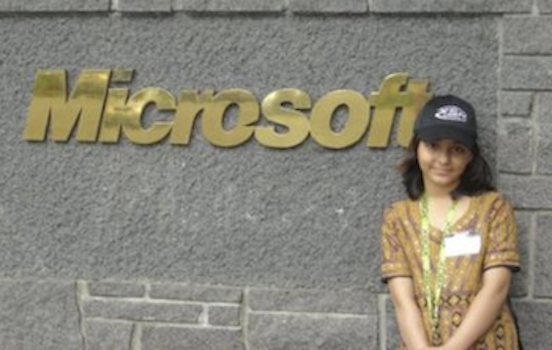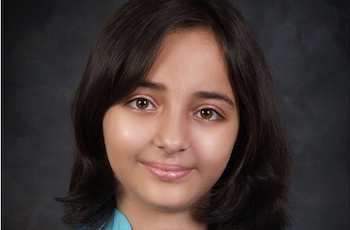
Arfa Abdul Karim Randhawa was born on February 2, 1995, into a Punjabi Jat family from the village of Chak Ram Diwali in Faisalabad, Punjab, Pakistan. Her father, Amjad Karim, was in the military, and her mother, Farah Karim, was a housewife. Furthermore, she had two younger brothers and one sister. Randhawa had a close relationship with her siblings. By helping with their schoolwork and encouraging them to pursue computer science, she aimed for them to pass the Microsoft Certified Professional (MCP) exam even younger than she had. Furthermore, she had a competitive spirit, a passion for sharing knowledge, and a strong belief in the potential of the next generation. Randhawa started attending Lahore Grammar School in Faisalabad at the age of six. From a young age, she showed an astounding memory and an interest in computers. Even though none of her family members were in the field of computer science, her parents were encouraging and supportive. Her father even bought her a computer when she was in third grade, where, by hit and trial, she learned the basics and soon began displaying impressive skills in Windows and other software. Noticing her impeccable intelligence, her father took her to a nearby computer institute called "APTECH," where she received formal instruction and certification, learning C sharp and other software. Soon, the institution suggested she prepare for the MCP (Microsoft Certified Professional) exam.
In 2004, at the age of nine, Randhawa broke the Guinness World record and became the youngest Microsoft Certified Professional and a computer prodigy. Randhawa astounded the world, including the CEO of Microsoft, Bill Gates, who invited her to Microsoft's Redmond Campus in the United States for a personal meeting in 2005. During the office tour, Randhawa asked Bill Gates why few women were working at Microsoft - an observation that reflected a broader issue: the significant underrepresentation of women in technology.
Upon returning to Pakistan after her visit to Microsoft, Randhawa became an icon, interviewed by numerous television channels and newspapers including Pakistan Television Corporation (PTV). In addition, S. Somasegar, the Vice President of Microsoft's Software Development Division, also wrote about her in his blog. On August 2, 2005, Randhawa was awarded the Fatima Jinnah Gold Medal in Science and Technology by Prime Minister Shaukat Aziz. She was also presented with the Salaam Pakistan Youth Award the same year. Randhawa then became the youngest person to receive the President's Award for Pride of Performance from President General Pervez Musharraf in 2005. This civil award is prestigious since it is usually awarded to individuals who display excellence in their respective fields over an extended period. Finally, in January 2010, she became the brand ambassador for Pakistan Telecommunication Company's 3G Wireless Broadband service, "EVO".

As an exceptional young woman, Randhawa was the pride and voice of Pakistan, representing her nation on several international platforms. For instance, in 2004, she attended the United States to participate in the TechnoKids Computer Curriculum International Competition and won first place. In November 2006, Microsoft invited her to be the keynote speaker at the Tech-Ed developers conference in Barcelona, which was themed Get Ahead of The Game. She was the only Pakistani among over 5000 developers at this event. Moreover, in 2005, the Pakistan Information Technology Professionals Forum invited her, along with Dubait dignitaries and the Ambassador of Pakistan, for a two-week stay in Dubai, where a dinner reception was hosted in her honor. Here, Randhawa was adorned with various awards and gifts, including a laptop.
Randhawa had big dreams, not only for herself but also for her community. She set up a computer lab in her village at the Government Girls High School 2-JB, Ramdi Wali, naming it “Karim Computer Learning Center” after her beloved grandfather. She hoped to educate people and propel them toward similar success, through this. She always believed in helping the underprivileged gain access to resources that would benefit their future goals. As another of her goals, Randhawa wished to attend one of her "dream universities," Harvard or the Massachusetts Institute of Technology (MIT), where she intended to major in computer science. Furthermore, she dreamed of working for a tech giant like Microsoft, returning to Pakistan, and revolutionizing the field of satellite engineering. Thus, she hoped to one day make Pakistan an Information Technology (IT) Hub.

However, her dreams and hopes were abandoned as her life was cut short. On December 22, 2011, Randhawa suffered an epileptic attack and went into a coma at the Combined Military Hospital (CMH) in Lahore. The doctors said she was suffering from idiopathic epilepsy seizures, which led to brain damage. Randhawa was on life support at the Intensive Care Unit when she suddenly suffered a complication and was shifted to the emergency room and then the operating theater. On January 14, 2012, at the age of 16, Arfa Karim Randhawa lost her battle for life, resting in her ancestral village near Faisalabad.
Randhawa had always taken pride in her roots. Despite coming from a "low-profile" family, she aspired to study worldwide and return to help and support the people in her village. Her impact was seen in the fact that the Chief Minister of Punjab, Shahbaz Sharif, and many citizens she had never met attended her funeral. To carry out their daughter's dreams, Randhawa's parents founded the Arfa Karim Foundation, a private non-profit organization, on July 3, 2012. It aims to serve the community of Pakistan, as Randhawa wanted to, by providing support in education, social innovation, and community development. The foundation runs IT training workshops and courses in various cities, including Multan and Lahore, to equip individuals with essential digital skills. It also offers fellowship programs aimed at inspiring the next generation of innovators. In addition, it promotes digital literacy in underprivileged areas by collecting and distributing used gadgets, ensuring that even those with limited resources have access to technology. Through these initiatives, the foundation continues to honor Arfa's legacy by empowering communities and fostering a more digitally inclusive Pakistan. Moreover, to honor Randhawa's legacy, the Lahore Technology Park, Pakistan's largest Information and Communication Technology (ICT) facility and the first built to international standards, was renamed "Arfa Software Technology Park" on January 15, 2012. Also, the Sindh government renamed the IT Media City in Karachi as "Arfa Karim IT Media City."
"Arfa used to say, 'Don't take our generation lightly,'" her father says. She was a role model to many young women, including education activist Malala Yousafzai, who spoke to BBC: "We really have lost a diamond." "When I heard about her, I was really moved. I was amazed that we had someone like her in Pakistan - a genius! I was proud of her and that she's a Pakistani." Therefore, Randhawa is an inspiration to many, displaying how, despite being so young and coming from a humble background, one's determination and hard work can transcend societal bounds. She has motivated many, especially young women in Pakistan, to go into STEM and bring glory to their country's name, just as she did.
Why Did I Choose to Research Arfa Karim Randhawa?
I researched Arfa Karim Randhawa because of her remarkable accomplishments and unwavering vision for Pakistan's future. She was only nine when she became the youngest Microsoft Certified Professional. This was certainly noteworthy for the world but even more huge for Pakistan, who loved and celebrated her and continues to do so today. Despite being just a child, she became a global symbol of intelligence and ambition, achieving milestones in the tech world that many dream of. Arfa loved school and worked hard to achieve her goals, which I was greatly inspired by ever since learning her name at a young age. What drew me to her story was how she not only broke barriers for herself as she was a very young woman from a simple background but also strived to uplift her country, dreaming of making Pakistan an IT hub and opening doors for others to succeed. At a time when women rarely went into STEM fields, especially in Pakistan, she was breaking Guinness world records in computer science. Her drive and dedication to the nation's progress inspire me, as I also wish to go into STEM and highlight Pakistan's name in the world. Today, when the youth holds more power than before, I hope to embody Randhawa's example as best I can.
Works Cited
Abbas, N. (2012, January 18). Arfa Randhawa death: Pakistan mourns IT girl genius. BBC News. https://www.bbc.com/news/world-asia-16599781#:~:text=Arfa%20Karim%20Randhawa%2C%20who%20became,to%20the%20company's%20US%20headquarters.
DAWN.COM. (2012, January 16). Arfa Karim Randhawa. DAWN.COM. https://www.dawn.com/news/688749/arfa-karim-randhawa
DAWN.COM. (2012a, January 14). Arfa Karim passes away in Lahore. DAWN.COM. https://www.dawn.com/news/688081/arfa-karim-passes-away-in-lahore
DAWN.COM. (2012b, January 15). IT project named after Arfa Karim. DAWN.COM. https://www.dawn.com/news/688408/it-project-named-after-arfa-karim
Jadoon, U. (2023, May 29). Arfa Karim Late – The Youngest Microsoft Certified Professional from Pakistan. Matics Today. https://www.maticstoday.com/2020/01/16/arfa-karim-late-the-youngest-microsoft-certified-professional-from-pakistan/
Tribune. (2022, May 19). 15 noteworthy Guinness world records that make Pakistan proud. The Express Tribune. https://tribune.com.pk/story/1485803/15-noteworthy-guinness-world-records-that-make-pakistan-proud/
This article was published on 11/8/24